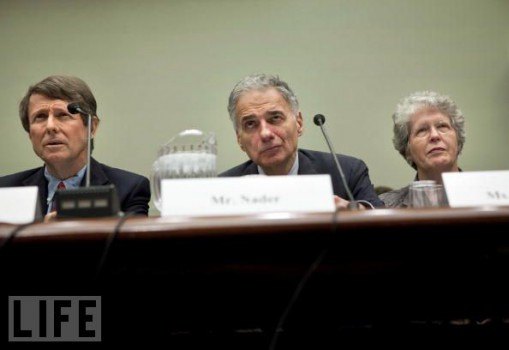Nader: Government Motors Forever!
We’ve heard a lot of arguments on all sides of the bailout, but we had yet to hear anyone call for prolonged government ownership and involvement in General Motors… until now. What follows is a letter from Ralph Nader, former NHTSA boss Joan Claybrook, Center for Auto Safety honcho Clarence Ditlow and Public Citizen president Robert Weissman, urging the Obama administration to suspend GM’s IPO and take firmer control of the government-owned automaker’s decisions on a number of issues including lobbying, employment and the environment. Because, despite appearing to be stuck in the 70s, Nader and company have never heard of British Leyland. Taste the madness below.
Dear President Obama,
The U.S. government bailout of, and acquisition of a majority share in, General Motors was anexceptional action, taken in response to exceptional circumstances. The U.S. stake in GM obviously poses novel managerial challenges to the government. The appropriate response to those challenges, however, is not to run from the responsibility through passive ownership and premature sale at a loss to taxpayers.
We write as GM prepares to undertake an Initial Public Offering (IPO) of stock that will reduce the government stake in the company to 43 percent. We urge that the government as primary owner arrange for the suspension of the IPO and then begin exercising the responsibilities attendant to ownership. We would like to highlight some of the numerous reasons for, and applications of, these recommendations.
1. Ensuring the best return to taxpayers
The government obviously has a serious fiduciary duty to taxpayers to obtain the best possible return on our investment in GM. This should not be the government’s only consideration in managing its GM stake, but it should be a priority.
News reports indicate the planned IPO will cause taxpayers to realize a $4.9 billion loss.1 Certainly no one can predict the future of GM or the markets with any certainty, but many analysts have offered the view that GM’s financial prospects are very positive. Simply recognizing how severely the Great Recession has crimped auto sales in the United States gives credence to this view; annual sales remain down by more than 25 percent from a few years ago. Many analysts believe that the IPO is being driven by a government desire to exit from GM ownership as soon as possible, even at the expense of better recoupment of the taxpayer investment.
Investor prudence thus counsels for maintaining the government’s current share, and delaying a sell off so that the government can capture likely improved returns in the future.
2. Protecting jobs and investment in the United States
We believe the government emergency investment in GM was necessary and proper, though we were and remain critical that the government imposed conditions on its investment to lower GM costs but not to advance broader public interest objectives.
The primary rationale of investing in GM had to be to preserve jobs and prop an economy in a severe downward spiral. As we pointed out at the time of the government investment, it was incumbent on the government to ensure that GM maintained production in the United States. There may be a rationale for GM to produce overseas for overseas markets, but it should not be opening new facilities abroad to ship back to the United States; and choices about facilities
As majority shareholder in GM, the United States has the ability to direct or influence the company’s investment decisions. As the U.S. reduces its share, so its capacity to influence such decisions diminishes. Had the government invested in GM for pecuniary reasons, the legitimacy of affecting such decisions would be lessened. But the government did not invest in GM for pecuniary reasons. It invested precisely to preserve U.S. jobs and manufacturing capacity. It is now incumbent on the government to manage its investment to advance these objectives.
Underscoring the importance of suspending the IPO to ensure protection of the U.S. national interests in GM are reports that various foreign auto manufacturers — including China’s SAIC — and sovereign wealth funds are considering purchasing large blocs of shares in GM.2
3. Addressing climate change, safety and environmental challenges
Looming over all the other great challenges facing the country and the world is the threat of catastrophic climate change. Addressing climate change is going to require massive, across-the- board changes in the way we generate, distribute and consume energy. No area will be more important than transportation.
Your administration has taken some positive steps in increasing vehicle fuel economy standards, but we need even more to achieve transformational change.
Holding a majority stake in one of the world’s largest auto makers, even if due to an historic anomaly, positions the U.S. government to directly advance the transformational changes we need. In addition to prodding the auto makers to do better through always-contentious and often-undermined regulatory processes, the government can and should direct GM to increase dramatically its investments in electric cars and other transformational technologies, and to make sure safety is not compromised with such new technologies.
The ability to direct such investments will decline as the U.S. share in GM declines.
Such direction makes even more sense given the second gift from TARP to GM in the bailout — a provision allowing GM to keep a $45 billion tax loss carry forward that normally is erased in restructuring. GM can avoid that amount in future tax liability on its profits.
4. Preserving our democracy from influence from unaccountable corporate entities
Whether by government directive or some very modest sense of propriety, GM suspended its lobbying and campaign contributions while undergoing the government rescue.
But now, outrageously, with the government still a majority shareholder, the company has resumed lobbying. To peruse GM’s lobby disclosure forms is to see a corporate entity working to shape policy on a broad range of issues, including: auto and truck safety, Wall Street reform, taxes, appropriations, climate change, fuel efficiency, trade (including trade agreements with Korea, Peru and Colombia, and negotiations at the World Trade Organization), and currency
Why in the world is a majority government-owned — that is, publicly owned — entity permitted to lobby the U.S. Congress and executive agencies, often against your own administration’s legislative and policy positions, such as the Motor Vehicle Safety Act of 2010 legislation to correct statutory deficiencies resulting in the Toyota debacle, presently pending in the House and Senate? With the ballot boxes barely counted, the Alliance of Automobile Manufacturers (of which GM is a prominent member) is already reneging on fuel economy rules it agreed to with your administration less than two years ago.
The government as majority shareholder should not permit this to occur; and it should not permit its shareholding stake to be reduced in such a way that GM gains greater latitude to affect policymaking.
As the government was preparing its rescue of GM, we highlighted each of the concerns mentioned here, and urged that they be addressed as part of the rescue process. Those recommendations were, unfortunately, ignored. But it is not too late for the government to exercise its control of GM responsibly, and to advance vital public interest objectives. We urge you to act to suspend the IPO.
Sincerely,
Ralph Nader
More by Edward Niedermeyer
Latest Car Reviews
Read moreLatest Product Reviews
Read moreRecent Comments
- SilverHawk Growing up in California, I ran the Corkscrew in a number of different low power sports cars, but nothing really fast. I had a real blast doing it in a 66 Barracuda Formula S that I could barely handle through the curves. The car had more skill than I had. Quite an experience.
- Fred This is one car I never see anymore. Where did they all go?
- Daniel Bridger The increased cost of electricity is raging faster than the government's manipulation of ICE fuel.
- Zipper69 Why the choice of a four door shell.Packing this tech into Stinger would have been awesome.
- Eric I have no desire to have an EV. Too expensive, no charging facilities within 50 miles are even planned, unproven technology, arguably even more environmentally harmful than ICE vehicles. Besides being a status symbol and to signal virtue, what's to like?

































Comments
Join the conversation
" Preserving our democracy ..." They mean preserving Progressive democracy. Democracy as interpreted by liberals.
Aaron & Roger - Go back to watching Faux News....Beck's sponsor has a deal on gold if you hurry!